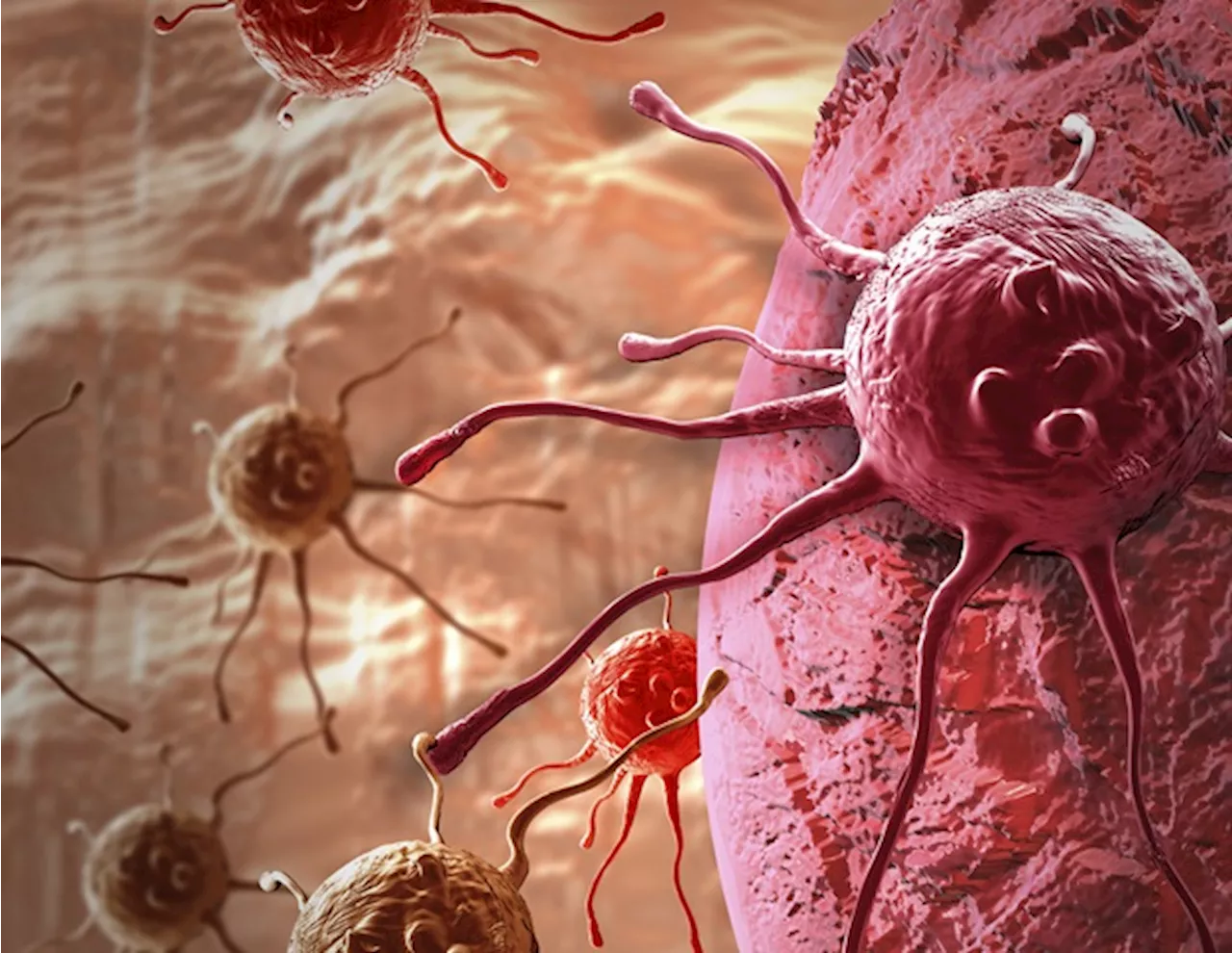A new combination immunotherapy shows promising results in treating superficial tumors like melanoma and breast cancer. Systemic interferon-I combined with topical imiquimod therapy effectively kills tumor cells at the treated site and activates the immune system to fight distant metastases.
A research team at the Medical University of Vienna led by Maria Sibilia has investigated a new combination therapy against cancer. This therapy employs systemic administration of the tissue hormone interferon-I combined with local application of Imiquimod.
This combination showed promising results in topically accessible tumors like melanoma and breast cancer models: The therapy led to the death of tumor cells at the treated sites and simultaneously activated the adaptive immune system to fight even distant metastases. The results published in the top journal Nature Cancer could improve the treatment of superficial tumors such as melanoma and breast cancer.In recent years, immunotherapies have had significant success in the treatment and cure of a wide range of cancers. However, for some patients, these agents are still not sufficiently effective. As part of a preclinical study, Maria Sibilia, Head of the Center for Cancer Research at the Medical University of Vienna, therefore investigated the effects of a combination immunotherapy consisting of systemic administration of the tissue hormone interferon (IFN)-I and local imiquimod therapy. Imiquimod is an active substance that activates the innate receptors TLR7/8 and used to treat basal cell carcinomas. The researchers employed various preclinical mouse tumor models of melanoma and breast cancer. What both tumors have in common is that they are accessible to local therapy and often form distant metastases. Immunotherapies use the body's own immune system to fight cancer cells. Plasmacytoid dendritic cells (pDCs), which are activated by Imiquimod via TLR7/8, play an important role in this process. The study showed that oral imiquimod stimulates pDCs to produce the tissue hormone IFN-I. This sensitized other dendritic cells and macrophages in the tumor environment to topical imiquimod therapy, which inhibited the formation of new blood vessels via the cytokine IL12 leading to the death of tumor cells. The combination immunotherapy not only had an effect on the treated tumors, but also on distant metastases. It reduced the formation of new metastases thus preventing tumor relapses and increasing the sensitivity of melanomas to checkpoint inhibitors. 'These findings illustrate that the combination of systemic treatment with imiquimod or IFN-I and topical therapy with imiquimod has the potential to expand treatment options for patients and improve therapy outcomes in locally accessible tumors such as melanoma or breast cancer,' emphasizes Maria Sibilia. Topical treatment of the primary tumor with imiquimod is essential for this combination therapy with systemic IFN-I to be effective at the treated site and also to clear distant metastases,' says Philipp Novoszel, MedUni Vienna, one of the first authors of the study. The results suggest that this therapeutic strategy has the potential to improve treatment outcomes in superficial and thus locally accessible tumors such as melanoma and breast cancer - on the one hand through therapy-associated cancer cell death at the locally treated tumors, but also through the induction of a T cell-induced anti-tumor immune response at distant metastases, which is further enhanced by checkpoint inhibitors. 'Our aim is to continue developing immunotherapeutic strategies in order to improve the long-term prospects for patients who are not yet responding well to these agents,' says Maria Sibilia, who is also Deputy Head of the Comprehensive Cancer Center of MedUni Vienna and University Hospital Vienna. 'As systemic interferon is a well-known cancer therapy and dendritic cells are activated in a similar way to our preclinical models, we believe that the new combination therapy can show an effect in patients,' adds Martina Sanlorenzo, dermato-oncologist at MedUni Vienna and co-first author of the study
CANCER IMMUNOTHERAPY MELANOMA BREAST CANCER INTERFERON-I IMIQUIMOD TUMOR THERAPY CLINICAL TRIALS
United Kingdom Latest News, United Kingdom Headlines
Similar News:You can also read news stories similar to this one that we have collected from other news sources.
 Neutrophil elastase test shows promise in predicting preterm birthNo previous study has been conducted in Nigeria on the role of neutrophil elastase in predicting preterm birth.
Neutrophil elastase test shows promise in predicting preterm birthNo previous study has been conducted in Nigeria on the role of neutrophil elastase in predicting preterm birth.
Read more »
 Stem cell therapy shows promise in restoring brain activity after strokeEvery 40 seconds, someone in the United States has a stroke. For survivors of the most common type of stroke, called an ischemic stroke, only about 5 percent fully recover.
Stem cell therapy shows promise in restoring brain activity after strokeEvery 40 seconds, someone in the United States has a stroke. For survivors of the most common type of stroke, called an ischemic stroke, only about 5 percent fully recover.
Read more »
 Qigong Shows Promise in Managing Chronic Low Back Pain in VeteransA pilot study conducted by Florida Atlantic University researchers indicates that qigong, a traditional Chinese practice, can significantly improve pain management and overall well-being in veterans with chronic low back pain.
Qigong Shows Promise in Managing Chronic Low Back Pain in VeteransA pilot study conducted by Florida Atlantic University researchers indicates that qigong, a traditional Chinese practice, can significantly improve pain management and overall well-being in veterans with chronic low back pain.
Read more »
 Semaglutide Shows Promise for Type 1 Diabetes ManagementA recent study published in Nature Medicine explores the potential of combining semaglutide with automated insulin delivery (AID) therapy for type 1 diabetes (T1D) management. The study found that semaglutide significantly improved glycemic control, reduced insulin needs, and led to weight loss in participants.
Semaglutide Shows Promise for Type 1 Diabetes ManagementA recent study published in Nature Medicine explores the potential of combining semaglutide with automated insulin delivery (AID) therapy for type 1 diabetes (T1D) management. The study found that semaglutide significantly improved glycemic control, reduced insulin needs, and led to weight loss in participants.
Read more »
 Mouse Protein Shows Promise in Combating Cancer through Epigenetic ModulationA study conducted by researchers at Johns Hopkins Kimmel Cancer Center and the Chinese Academy of Sciences has identified a mouse protein called STELLA that effectively disrupts cancer-causing epigenetic changes in genes associated with human colorectal cancer. This discovery opens up new avenues for developing targeted therapies against solid tumors.
Mouse Protein Shows Promise in Combating Cancer through Epigenetic ModulationA study conducted by researchers at Johns Hopkins Kimmel Cancer Center and the Chinese Academy of Sciences has identified a mouse protein called STELLA that effectively disrupts cancer-causing epigenetic changes in genes associated with human colorectal cancer. This discovery opens up new avenues for developing targeted therapies against solid tumors.
Read more »
 Extended Paxlovid Treatment Shows Promise for Long COVID Patients: Case SeriesA new case series suggests that longer courses of Paxlovid may be beneficial for some individuals experiencing long COVID symptoms. The study highlights the need for further research to determine the optimal duration of treatment.
Extended Paxlovid Treatment Shows Promise for Long COVID Patients: Case SeriesA new case series suggests that longer courses of Paxlovid may be beneficial for some individuals experiencing long COVID symptoms. The study highlights the need for further research to determine the optimal duration of treatment.
Read more »
